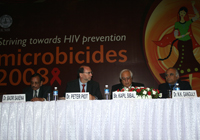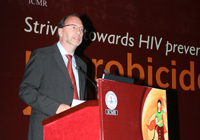
Репортаж
Microbicides 2008 concludes in India
27 февраля 2008 года.
27 февраль 200827 февраль 2008

The biannual international microbicides
conference “Microbicides 2008” ran 24 –
27 February in New Delhi under the
theme “Striving towards HIV Prevention”.
Credit: Microbicides 2008
The biannual international Microbicides 2008 conference concluded Wednesday 27 February in New Delhi.
The scientific and networking conference was opened on Sunday by the Union Minister for Health and Family Welfare, Dr Anbumani Ramadoss.
More than 1,100 researchers, public health workers, communities and advocacy organizations gathered for the four-day meeting to discuss current research and development of a safe, effective and accessible microbicide which women could use to prevent the transmission of HIV and other sexually transmitted infections.
The meeting took place in the context of a year of mixed results in candidate microbicide clinical trials. A cellulose sulfate trial was stopped early due to safety concerns, while Carraguard, a candidate microbicide which completed large-scale Phase III trials, was found to be safe but not effective in preventing HIV transmission. These results were unexpected but all findings shed more light onto the research avenues.
The event ended on a positive and hopeful note. Addressing the closing ceremony, UNAIDS Executive Director Dr Peter Piot acknowledged the difficult time it has been for microbicide research but focused on the progress made in the field so far.
Emphasizing the importance of rising above these challenges and huge value of overcoming them, Dr Piot said in his speech, “Developing an effective microbicide will be a critical step forward in the AIDS response. To provide women with HIV prevention technology they can use themselves will be nothing short of revolutionary.”
The conference programme was overseen by an international scientific advisory committee and included plenary sessions, presentations of original research, round table discussion sessions, symposia and satellite meetings and poster sessions and exhibitions. A broad range of topics were discussed in four simultaneous tracks.

Dr Piot said in his speech that “Developing
an effective microbicide will be a critical
step forward in the AIDS response. To
provide women with HIV prevention
technology they can use themselves will
be nothing short of revolutionary.”
In the Basic Science track, topics included updates on the microbicide pipeline of current and emerging candidates, latest understanding of HIV sexual transmission, drug discovery, advances in formulations.
In the Clinical track lessons learned from cohort studies were explored as well as findings from Phase I, II and III Trials. Amongst other topics was the impact of other HIV prevention trials.
The Social Science track looked at behavioral and social science research tools, acceptability, lessons from managing the closure of multi-country HIV prevention trials and the role of men in microbicide use.
Under Community and Advocacy, many aspects of community engagement in trials were considered including managing stakeholder expectations of trial results and the importance of partnerships for HIV research.
Several cross-track discussions were also held, exploring challenges, experiences and lessons learned.
It is the first time that the meeting has taken place in the Asian region. Previous meetings have been held at Washington DC in 2000, Antwerp in 2002, London in 2004, and Cape Town in 2006. Each occasion takes researchers and activists further in their understanding of the challenges of microbicide development.
For all present this week in New Delhi, it is hoped that by the time of the next meeting in 2010, we will have turned a real corner on the road to delivery of a safe, effective and accessible microbicide which could make a difference to women’s lives.
For more information visit the Microbicides 2008 conference web site at http://www.microbicides2008.com/
Репортажи по теме
 Радуга надежды для сообщества ЛГБТКИ+ в сельской Японии
Радуга надежды для сообщества ЛГБТКИ+ в сельской Японии
17 мая 2023 года.
 Таиландский фонд Mplus: новый стиль оказания услуг, связанных с ВИЧ
Таиландский фонд Mplus: новый стиль оказания услуг, связанных с ВИЧ
13 декабря 2022 года.
 Предотвращение передачи и борьба со стигмой: сила формулы U=U
Предотвращение передачи и борьба со стигмой: сила формулы U=U
12 декабря 2022 года.
